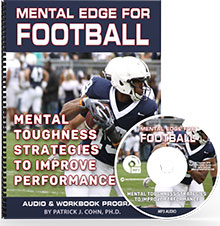
Being Accountable for Your Choices
What is the best strategy to improve your game or play at a high level consistently? Lifting your game higher requires you to hold yourself accountable for your choices and actions.
When you take personal responsibility for your performance, you gain a sense of control over your career. You put in the work in training and practice. You perform the little things behind the scenes that give you a significant competitive advantage.
You are focused on your preparation in games as well, as in practices. You compete in practice. You don’t take a play off or waste an opportunity to raise your game. When you prepare and leave no stone unturned, you will have elite confidence and perform at your peak consistently.
Let’s look at accountability in greater depth. When you choose to play the blame game, you see nothing as your fault. With that perspective, you can do little to nothing to play better.
For example, a wide receiver that drops two passes in the end zone for potential touchdowns can blame the quarterback. Even though the ball was catchable, the receiver failed to accept responsibility, “Every pass our QB attempts is off-target.” A statement such as that gives you no feedback for improvement.
On the flip side, the receiver can look for ways to improve technique to be more successful under similar future circumstances, “I need to use my body to shield off the defender better.” That’s accountability!
Accountability also affects the way you prepare. If you hold yourself to a reasonably high standard, you will prepare thoroughly for each training session. You will look for ways to improve your game, such as diet, mental toughness training, or speed and agility work. You will push yourself to improve each week.
Accountability separates those players who raise their level of play year after year and those who remain stuck and never reach their potential.
Philadelphia Eagles offensive lineman Jordan Mailata has recognized wide receiver DeVonta Smith for his dedication and accountability.
Smith was selected 10th overall in the 2021 NFL draft by Philadelphia.
MAILATA: “If you see Smitty and how he conducts himself every day, he’s so accountable, he’s so professional about his routine… He comes here before some of the trainers in the morning. I see him in his locker with his iPad doing the extra stuff he does. In the gym, we work out, dude’s leading in there, trying to break scores, trying to make numbers. It’s incredible.”
The actions you take behind the scenes make a big difference. Preparation gives you confidence, but it all starts with accountability.
Being Accountable:
Accountability can be broken down into two major components: evaluation and preparation.
Evaluation is asking yourself, “What can I learn from my play or mistakes in this game or practice?” “How can I perform better in future situations?”
Preparation is asking the question, “What actions can I take to improve my game, overcome my bad habits, and learn from my mistakes.
Accountability is the road to success that many players choose not to take.
Related Sports Psychology Articles
*Subscribe to The Sports Psychology Podcast on iTunes
*Subscribe to The Sports Psychology Podcast on Spotify
Download a free sports psychology report to improve your mental game!
Learn more about our one-on-one mental game coaching.
The Mental Edge for Football

Are you (or your athletes) performing inconsistently in games with less confidence in games than in practice? Do you lose confidence easily after a couple of blown plays? Do you become so frustrated with your game that you can’t focus on the next play? If you answered yes to these questions, it’s a good bet that your mental game might prevent you from consistent performance in games.
“The Mental Edge For Football” is a complete brain dump of the TOP eight mental training sessions we teach our football players to help them boost their mental game and improve consistency – from how to mentally prepare for games to performing under pressure to building unstoppable confidence.